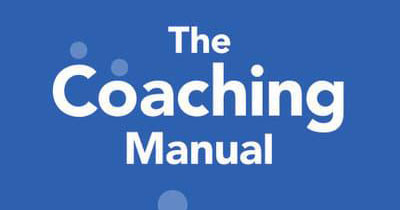If you want to sharpen your coaching skills, then grab a copy of coaching guru Julie Starr’s book. The Coaching Manual is a go-to guide for anyone who wants to become a more effective coach, writes ALEXA TERRY.
Singing teachers raise your hand if you have ever:
- Had a bout of verbal diarrhoea and found yourself talking more than the student during a singing lesson.
- Tried to ‘fix’ a student’s mental obstacles during vocal training.
- Become so excited about something you had learned that your ego decided to join the singing lesson.
If this was a drinking game, some of us might be feeling rather squiffy by now. The Coaching Manual by Julie Starr, however, can clear cloudy heads with its guide to effective coaching.
Who is Julie Starr?
Starr is managing director of Starr Coaching, a university lecturer and an events speaker. She also writes fiction for children and young adults.
This book is…
A game-changer. It explains how to use coaching techniques to enhance an individual’s self-awareness, ongoing learning and success. The Coaching Manual (4th edition) has the power to alter the way we interact with others and the way we manage our own time and energy so that we enjoy a more fulfilling work and personal life. It has quickly become one of my favourite non-fiction books.
This book is for you if you want to:
- Become a coach (in any field) or better your coaching skills and techniques.
- Understand the fundamentals of being an effective, collaborative coach.
- Learn how to overcome barriers in coaching sessions.
- Understand the basic structure of a coaching session (and adapt this structure to benefit a singing lesson).
- Develop emotional maturity.
- Identify your strengths and weaknesses as a coach for continued development.
This book is not for you if:
- You are looking for advice on marketing and finance; Starr focuses purely on the interaction between coach and client.
- You want scenarios that specifically cover vocal coaching. It is a guide to managing any coaching situation, although most of it applies to singing teachers.
Stepping into the pages
This book contains:
- An analysis of the advantages and disadvantages of directive and less directive coaching styles.
- The fundamentals of effective coaching, including how to build rapport, actively listen, interpret subtext, utilise intuition and communicate feedback.
- Advice on overcoming barriers, like avoiding talking too much, being too reliant on breakthrough moments, and trying to control an outcome.
- Examples, written in the style of a play script.
- Anecdotes, questions, exercises, checklists and hints to help the reader reflect on their current coaching approaches and develop their coaching skills.
Starr’s coaching style is client-centred and champions team spirit and self-awareness – an approach which suits the vocal coach and singer set-up well. When reading the book, I did however sometimes feel a little overwhelmed by the multi-tasking that is required. Not only do we singing teachers need a thorough knowledge of the voice, but we must also be able to read body language and tone of voice, and tune into a client’s language.
Applying all the coaching skills outlined in the book will take time, but thankfully Starr encourages us to be kind to ourselves and work at a manageable pace. Reading through, I was able to highlight some of the more effective tactics I already use as a coach and those which need a little polish.
Six tips from the book
- Listen (stop talking so much – silence can be powerful).
- Ask more open questions and encourage the client to think; this can lead them to better self-awareness.
- Challenge constructively.
- Give objective feedback.
- Be a facilitator. “View your involvement as that of a facilitator in someone’s own learning process, rather than the cause of it,” writes Starr. Allowing the singer to verbalise their findings can solidify their learning.
- Stop focusing on breakthrough moments. They are rare.
How this might apply to the vocal coach
Have you ever found yourself offloading the importance of practice to a singer, only to discover that they never engage with it outside of their lessons? After reading The Coaching Manual, I realised that it’s not enough for us to tell the client about the benefits of singing practice. Nor is it reasonable for us to be wholly responsible for a singer’s actions or success.
Starr states that “solutions are normally of greater relevance and effectiveness as they emerge from the understanding of the person experiencing the situation”. In other words, unless the singer recognises the advantages of quality practice and relates its importance to their circumstances, it’s unlikely to be a priority.
Singing teachers can use a range of techniques to help motivate students (read our practice tips here). We can also help identify any obstacles and influence a positive action plan.
In the style of the book, the scenario may play out like this:
Coach: You expressed interest in developing chest voice, which you describe as breathy and weak, and so we spent time exploring potential culprits. What do you remember of that?
Singer: I felt the difference when using creak onsets and the tools to manage airflow. I could hear how much more body had been added to the sound when we listened back to the audio.
Coach: Excellent! We also looked at some repertoire suggestions ahead of your college auditions in the Autumn. So, how you have been getting on since we last met?
Singer: If I’m honest, I’ve been so busy that I haven’t practised. I’ve been exhausted.
Coach: I’m sorry to hear that you have been feeling tired. Can I make an observation?
Singer: Of course.
Coach: You have expressed a desire to audition for musical theatre college, and to improve your chest voice. You recognise how specific tools and exercises have a positive effect on your voice, but each week you say that you haven’t practised. What might be stopping you from working towards your goals?
Singer: It’s all just a bit busy, and I can’t keep up.
Coach: I guess that can be overwhelming. How would it feel to sing with your desired sound and to be offered a place at a musical theatre programme of your choice?
Singer: It would feel amazing. I would feel so much better about singing material which I currently avoid. Even thinking about it makes me excited.
Coach: How could you accept some responsibility or influence over this situation?
Singer: (Is silent for a moment). My time management is rubbish. I set my alarm for 9am, but I sleep through it. Most mornings, I get up at 11am.
Coach: Okay – what else might help you better manage your time?
Singer: I get distracted by social media. I scroll through Instagram feeds and, all of a sudden, an hour has passed, and it’s time for my shift at the supermarket.
Coach: What needs to happen for you to manage your schedule so you can work towards your goals?
Singer: I could get up earlier.
Coach: And what might help you to do that?
Singer: I could put my phone on the other side of my bedroom so that I need to get out of bed to turn it off. That way, I’m already up and won’t be tempted to hit the snooze button.
Coach: What else could you do to help achieve your goals?
Singer: I could leave my phone in a different room, so I don’t get so distracted.
Here we have acknowledged the singer’s lack of commitment to practice, without being judgemental. We’ve also empowered them to recognise their own ability to respond to the situation with a plan of action.
Conclusion
The Coaching Manual is not a boring preach, but a friendly guide to navigating coaching sessions and day-to-day life. It made me feel uplifted and inspired not only in my approaches as a vocal coach, but with the knowledge that I have much more influence over my personal life than I had first regarded.
Complementary resources
– The Coaching Habit by Michael Bungay Stanier.
– The Prosperous Coach by Steve Chandler and Rich Litvin.
If you have any questions or comments you can share them on the BAST Trainers Facebook group.




